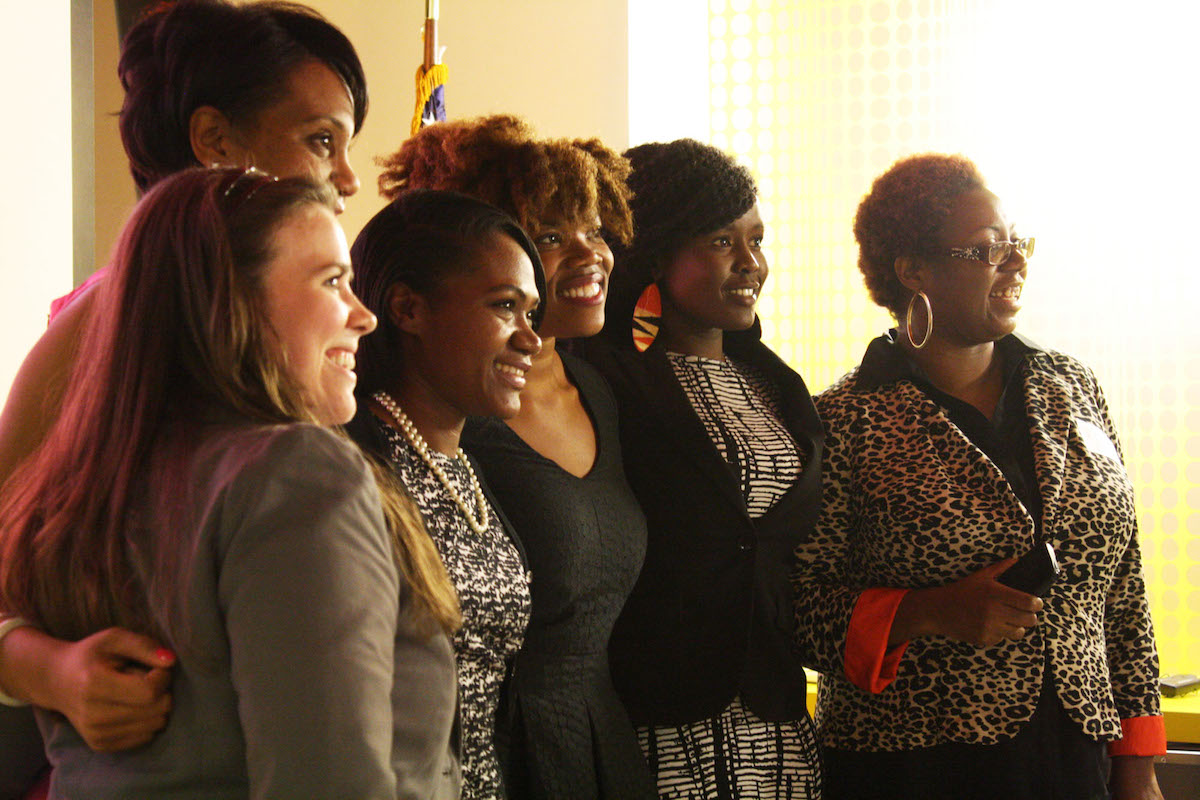Add “side hustle” to the list of terms associated with women and technology.
The term was repeated often at DC Web Women’s Millennial Women in Tech roundtable discussion Wednesday night. Eight women contributed to the conversation, all of whom pursued side hustles as a way to promote STEM or continue to develop their careers.
Vienna Mbagaya, a public health consultant, travels to college campuses to encourage millennial immigrants and first generation Americans to consider careers in STEM.
Babs Lee works a 9-to-5, built her own app and helped run DC’s Startup Weekend.
Ashley Holtz is one of three women in her practice of around 200 at KPMG, where she works as a software engineer. On the side, she serves as DC Web Women’s outreach co-director.

Millennial speakers shared successes, failures and current struggles at DC Web Women’s roundtable discussion. (Photo by Ashley Nguyen)
But despite these women’s dedication to tech, most of them didn’t grow up in STEM-heavy environments.
“I never touched tech,” said Kaitlin Carpenter, a marketing strategist originally from Idaho. “They had some classes, but it was a basement full of guys, and I didn’t want to be that girl. Moving to DC and seeing all these great initiatives was so eye-opening, and I finally started learning a bit [of coding].”
No prior knowledge
STEM is highly encouraged among youth today, but that wasn’t necessarily the case 10-15 years ago — which is why some millennial women are starting from scratch.
Facebook can say it wants to hire more women, but we need to teach the next generation so that they’re ready for those opportunities.
On a panel at American University, Holtz asked students to raise their hand if they knew anything about coding. Only one woman did.
“Having all-female tech groups for is really important,” Holtz said. “It offers an environment where your confidence can be boosted. Even people going through career changes in their 40s and 50s need [these groups] to have a support system and an understanding of what education you need.”
Having a mentor can help you find direction, CEO and founder of SOCIALgrlz Marissa Jennings said. But it also helps if you find a mentee to help grow the next set of 20- and 30-something women leaders.

Ashley Holtz offers advice on getting young girls more interested in technology. From left to right: Holtz, Babs Lee, Kaitlin Carpenter and Latesha Goodman. (Photo by Ashley Nguyen)
After teaching herself a little bit about coding, Carpenter volunteered with GROW — a program that educates girls ages 8-12 in web development — she saw young girls grasping concepts she’d just learned.
“Facebook can say it wants to hire more women,” Carpenter said, “but we need to teach the next generation so that they’re ready for those opportunities.”
Human Contact = Better Coder
Having all-female tech groups for is really important.
While many of the speakers were self-taught computer programmers, they emphasized the power of human contact. Rather than spending hours online, find someone to ask — male or female.
“There are guys out there that are willing to help you if you ask,” Lee said. “They’re allies.”
“DC is amazing,” Carpenter added. “You 100 percent need to take advantage of the physical space with people who are there to look over your shoulder.”
Interested in becoming a woman (or man) in tech but don’t know how? Check out these resources for all levels mentioned during the discussion:
DC resources:
Online resources:
- Code Academy
- MIT Open Course Software
- Lynda
- thenewboston YouTube tutorials
- Udacity
- Coursera
Before you go...
Please consider supporting Technical.ly to keep our independent journalism strong. Unlike most business-focused media outlets, we don’t have a paywall. Instead, we count on your personal and organizational support.
3 ways to support our work:- Contribute to the Journalism Fund. Charitable giving ensures our information remains free and accessible for residents to discover workforce programs and entrepreneurship pathways. This includes philanthropic grants and individual tax-deductible donations from readers like you.
- Use our Preferred Partners. Our directory of vetted providers offers high-quality recommendations for services our readers need, and each referral supports our journalism.
- Use our services. If you need entrepreneurs and tech leaders to buy your services, are seeking technologists to hire or want more professionals to know about your ecosystem, Technical.ly has the biggest and most engaged audience in the mid-Atlantic. We help companies tell their stories and answer big questions to meet and serve our community.
Join our growing Slack community
Join 5,000 tech professionals and entrepreneurs in our community Slack today!

The person charged in the UnitedHealthcare CEO shooting had a ton of tech connections

From rejection to innovation: How I built a tool to beat AI hiring algorithms at their own game

The looming TikTok ban doesn’t strike financial fear into the hearts of creators — it’s community they’re worried about


